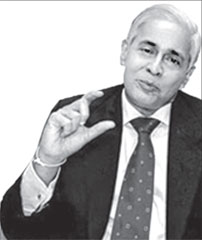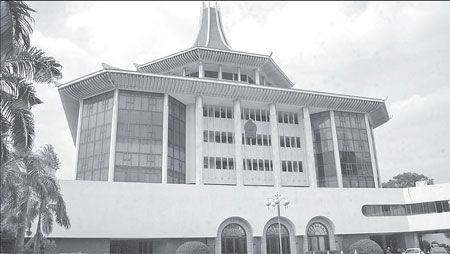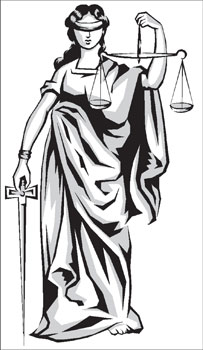|
President can remove a SC Judge when impeachment
motion is passed in Parliament :
Procedure followed in keeping with the Constitution
and Standing Orders :
 Judiciary
cannot change the Constitution - Former Chief Justice Sarath N Silva Judiciary
cannot change the Constitution - Former Chief Justice Sarath N Silva
Public Service Commission has the power to take
disciplinary action :
An impeachment motion is a disciplinary action :
Q: Controversy surrounds the recent
determination of the Supreme Court. You have a wide knowledge on the
judiciary. What is the due process to bring an impeachment motion
against the Chief Justice or a Supreme Court Judge?
A: What you are saying is
correct. There had been impeachment motions even in the past and even
against me. But those did not receive public interest. Those were solved
at that level. The most important thing is there should only be a
Parliamentary procedure in this regard. The extraordinary fact we now
have is that there is a judicial procedure parallel to the Parliamentary
procedure. Then the public have to consider both these. A few days ago,
the matter was before the Judiciary and before that it was before
Parliament. This has led to some confusion.
That is why even I also decided to participate in this programme.
This confusion is not good for the country, the Judiciary and
Parliament. Therefore, the public must be educated on the reality.
An impeachment motion is a disciplinary action. You also serve an
institution. I also served for 41 years. All who work, from the rank of
the Chief Justice to a lowest grade employee, have to agree to service
contracts. There is an employer and an employee in a service contract.
The government is the employer when it comes to the public service. The
Public Service Commission has the power in the public service. It is
this committee which appoints and takes disciplinary action.
There are several levels in the judiciary. The lower level is
comprised of Magistrates, Primary judges and District Court judges.
The Judicial Service Commission (JSC) has the power to appoint them.
The next level is comprised of High Court judges. The President and
the JSC have the power with regard to them. The President appoints them
according to the recommendations of the JSC. But even the President has
a choice. Even the disciplinary action is taken according to the JSC
recommendations. The President has the power to neglect them as well.
There had been instances of such things happening in the history.
 The
disciplinary power lies with Parliament, but not entirely. The President
can remove a Superior Court Judge when an impeachment motion is passed
in Parliament with a simple majority. The President is the officer in
charge of the appointment and well as removal. Parliament puts the
impeachment process in between. This procedure is followed in many
countries of the world, including the UK. In UK there are two
parliamentary boards. The judges in Superior courts are removed once the
resolutions against them are passed in those two boards. Sri Lanka too
followed this method in the past. According to the 1948 Constitution,
the Governor or the President removed a Superior Court Judge once a
resolution was passed. The
disciplinary power lies with Parliament, but not entirely. The President
can remove a Superior Court Judge when an impeachment motion is passed
in Parliament with a simple majority. The President is the officer in
charge of the appointment and well as removal. Parliament puts the
impeachment process in between. This procedure is followed in many
countries of the world, including the UK. In UK there are two
parliamentary boards. The judges in Superior courts are removed once the
resolutions against them are passed in those two boards. Sri Lanka too
followed this method in the past. According to the 1948 Constitution,
the Governor or the President removed a Superior Court Judge once a
resolution was passed.
One more fact was added to this procedure under the 1978
Constitution. That is Article 107 of the Constitution. There are
regulations as to how to conduct a parliamentary investigation on the
charges. According to Article 107 (3) of the 1978 Constitution,
Parliament should compile a procedure to investigate on the impeachment.
It can be done under a law or standing orders. Parliament has a choice
either to compile a law or Standing Orders with regard to impeachment
procedure.
When the impeachment motion against Neville Samarakoon was presented,
it was understood that a law or Standing Orders with regard to
impeachment procedure were lacking.
Then Parliament compiled Standing Orders in this regard in April
1984. This Standing Order has been operational for 30 years now since
1978. The Impeachment motions against Neville Samarakoon and three more
Superior Court Judges were investigated under these Standing Orders.
This is the present context. The method to present an impeachment motion
is set out in the Standing Orders. According to the Constitution, the
impeachment motion should be signed at least by one third of the Members
in Parliament. The charges should also be mentioned in it. This is a
procedure basically to educate Parliament rather than making a
complaint. They educate Parliament about the charges. Thereafter, the
Speaker should direct the investigation to a Parliamentary Select
Committee (PSC) according to the Standing Orders.
Q: So the Speaker appoints the PSC
under the Standing Orders?
A: Until the issue reaches
the Speaker, it should be dealt under the Constitution. From that point
onwards, the Standing Orders apply with the appointment of the PSC. The
Speaker appoints the PSC, as he would appoint any other PSC. The
representation in it is based on the strength of the parties in
Parliament. That means a greater share will be for the government. The
membership of the PSC is decided on the composition of Parliament.
Accordingly, 11 members have been appointed to it. Seven among them are
from the government, two from the main opposition party and one each
from other opposition parties. So until this stage, the procedure which
was followed on the above mentioned Standing Orders. So, we can clearly
see that this procedure followed was in keeping with the Constitution
and the Standing Orders.

Q: Does the Chief Justice have the
right to clarify facts before the PSC to counter the charges made
against her ?
A: According to the
Standing orders, the Chief Justice can present facts during this
investigation. Even the representation of lawyers on her behalf is
allowed. If required she can be absent while having her lawyers
represent her. These things are very clearly mentioned in Standing
Orders.
Q: When considering this particular
matter, has the impeachment investigation proceeded in a proper manner?
A: Yes. It has. The
presentation of the motion, the signing by one third, and mentioning of
the charges were duly done. As I see, facts with regard to 14 charges
had clearly been mentioned.
Q: How do you see this situation?
A: There is an another
angle in this. As soon as the Parliamentary proceedings get started with
regard to this mater, some sections of lawyers, like Chandra Jayarathna
filed a case before the Court of Appeal in parallel to the proceedings.
In return, the Court of Appeal gave a verdict requesting an
interpretation of Article 107/3 of the Constitution by the Supreme
Court.
Subsequently, the Supreme Court informed Parliament that the
proceedings would be stopped until the hearings of the case were
finished. This was the place where the dispute was created. The
statement of the CJ's lawyer before the PSC was to stop the inquiry as
per with the Supreme Court order. Then, the PSC had turned down it
highlighting that investigations were carried out under the Standing
Orders and they were bound by Parliament to finish inquiries and submit
the report within one month.
Then, the problem was mooted. But CJ's lawyers did not quit in that
moment.
Q: It means if the proceedings were
to be stopped in that manner can the Supreme Court do this?
A: As far as I can see,
there is no any room for any interference by the Supreme Court in
keeping with the constitution. The
Interference of the Supreme Court was witnessed when the case was
being heard before the Courts of Appeal. No provisions have been given
to the Court of Appeal in this regard. Under such circumstances, the
Court of Appeal has to function in line with Article 140 of the
Constitution. It has been vested with the power to issue a Writ of
Certiorari in such situations.
These are the complicated terms which are available in Latin language
in the Constitution. In Britain, these old-fashioned Writ applications
were issued by the Board of the Queen or King according to English law.
These were not available in the Constitution until now. These were found
under normal Law in the 1948 and 1972 Constitutions. Subsequently, this
was added to the 1978 Constitution under the Courts Act.
This power was given to the Court of Appeal with two restrictions in
in Article 140 in issuing writ applications that should be compatible
with the constitution and the law. The term, “law” has been clearly
mentioned there. Now it has been interpreted in Article 170 of the
Constitution.
Law means a law imposed by either Parliament or Constitutional Board.
But it should have the power to create the constitution. Only Parliament
is relevant in this regard though no law has been imposed on this yet
since 1978.
 The
same problem arose when I was in the Attorney General's Department in
the 1980s. We didn't oppose it and continued the old system. The old
system was the verdict given by the court of Great Britain.That's what
we called “ Common Law”. We also functioned in the same manner which was
convenient. We also achieved the same development as experienced by
England. We confronted no problem in doing that. According to English
law, no where have we found a court that had given verdicts against
Parliament. It was due to the fact that the English law was developed
preventing clashes between various institutions. That law was developed
for centuries in the same manner. The
same problem arose when I was in the Attorney General's Department in
the 1980s. We didn't oppose it and continued the old system. The old
system was the verdict given by the court of Great Britain.That's what
we called “ Common Law”. We also functioned in the same manner which was
convenient. We also achieved the same development as experienced by
England. We confronted no problem in doing that. According to English
law, no where have we found a court that had given verdicts against
Parliament. It was due to the fact that the English law was developed
preventing clashes between various institutions. That law was developed
for centuries in the same manner.
No court in England had issued a Writ of Certiorari to a Speaker or
Parliament. Do the courts have the power to issue an order against the
Speaker or Parliament? Because this has been clearly mentioned in
Article 140 of the Constitution that this should be implemented
according to the law.
Q:Former Speaker Anura Bandaranaike
made a clear statement in this regard during your tenure?
A: It was about
fundamental Human Rights. The breaching of HR is mentioned in Article
126 only with reference to Executive or administrative affairs. No
Parliamentary proceedings were mentioned in this regard. No body can
file a petition against Parliament claiming that their basic human
rights are being violated.
If we take action against an employee of Parliament it becomes an
administrative matter. There, we find a Fundamental Rights case.
That's what happened during Anura Bandaranaike's period. Then, a
group of lawyers filed a case that before appointing a PSC, the Speaker
should initiate an inquiry over the matter. The Speaker turning down the
order decided that courts had no jurisdiction to give orders to the
Speaker.
Then, only I knew the legality of this matter. I was not aware about
the facts that they were ready to file a case.
I told them that this would create a dispute. I understood that I
would be crushed from both sides and requested them to withdraw the
case.
Q: According to your description
Parliament can appoint a PSC and probe the charges. On the contrary, the
Court of Appeal recently claimed that the PSC was illegal. What is this
contradiction ?
A: That is a problem. The
Court of Appeal has no jurisdiction to interpretate the constitution.
The court of Appeal forwarded this to the Supreme Court expecting an
interpretation of the constitution in this regard. The normal procedure
was for the Supreme Court to take two months to send the interpretation
to the Court of Appeal.
Q: Are you saying this was done with
preparation?
A: I cannot mention such
while being in the courts. But it seems that there is an order. I am
reluctant to use the term” preparation”.
This is being done on an order. The verdict was given before the
holiday season. The Court of Appeal was on leave even by yesterday. But
the court function on urgent applications even during holidays. But not
for the applications of this calibre. I have the verdict with me. I
looked at it and find that the investigation was carried out on December
14. It had time up to February 14, 2013. But the decision has been taken
on January 1 means the judges had prepared the verdict even during the
Christmas vacation. I consider this an important matter. My expectation
is to solve the problems of the public with enthusiasm.
I am not making an accusation. I tried my best to expedite cases as
much as possible. I was not in a hurry to give verdicts during holidays.
I considered holidays as holidays. Only if there was an old case, I
would attend to it.
The salient feature of this verdict was this had to be done as an
interpretation of the constitution. Whenever any problematic areas
were raised in other courts, those should be forwarded to the Supreme
Court as per with the provisions of Article 125. The verdict of
the Supreme court in this regard was critical. There were 28 pages
out of which 23 pages were restricted to fundamental matters. If I were
in the Supreme Court. I would have stated with honour that cases of
former CJ Neville Samarakon and my previous verdicts had no relevancy to
his case. Article 107 has no implication in this respect. The verdict
which was written in English has mentioned that this was the
interpretation of the constitution. But, It is clear, under Article
107/3 has specific obligation how can parliament remove judges from the
posts.
In fact, they have not done any interpretation. I, with great
respect, would like to tell the supreme Court if any interpretations
have been made what did those words mean? What connection did it have?
Here there is a serious recommendation that Parliament has a
responsibility? In addition, Article 107 of the the Constitution clearly
indicates the procedure of the impeachment motion through either
Parliamentary powers or Standing Orders. To understand this article, no
body wants to be an expert. Here, the Supreme Court has not mentioned
any interpretation in this regard.
Q: When the Constitution has clearly
mentioned about the procedure how did this interpretation come about?
A: I have also spent for
41 years in this field. I cannot explain it? If I answer your question
in a Cricket manner. I can say that I would be bowled. The Supreme Court
has used in this article as “by” under lining the word “law” that this
should only be done through law. Now, this is a very serious matter.
Only Parliament holds this right. Parliament has the discrepancy to
either create a law or form Standing Orders at this juncture as per with
Article 107/3. In 1984, Parliament worked with this discrepancy. For
almost 30 years, it was mentioned that only Standing Orders would be
relevant to this. These Standing Orders were effective from there
onwards. Now even Parliament cannot bring a law in this regard though it
has the legal provision through the Constitution.
Q: If we practice as per with
Standing Orders don't we have any other methods.
A: There is no other ways.
The Supreme Court has mentioned that they don't take into consideration
the Standing Orders. To the
Supreme Court, the Standing Orders were not valued. Now the verdict
of the Supreme Court has been made public and we have a right to
investigate the verdict. But that should be done only with good mind.
We should do it just to further confirm the supremacy of the law. If
the supremacy of the law is violated we should show it. The law should
be interpreted in a correct manner. That's what I am doing. |







